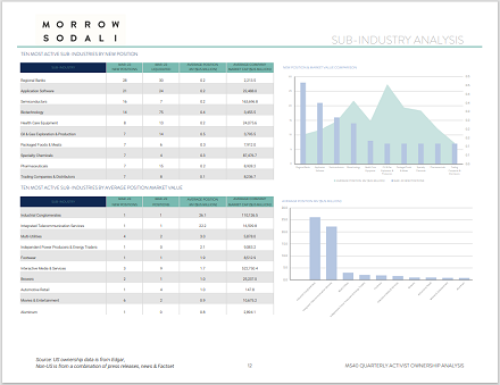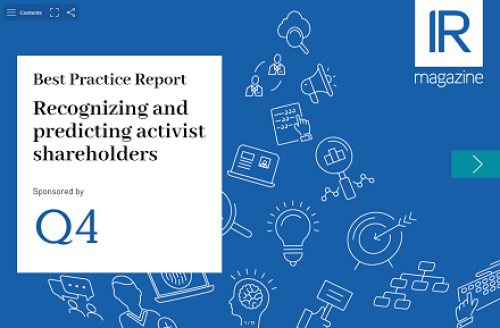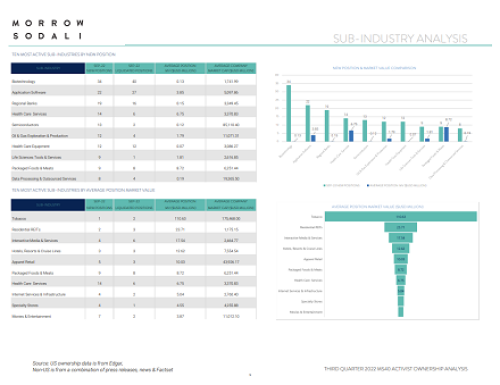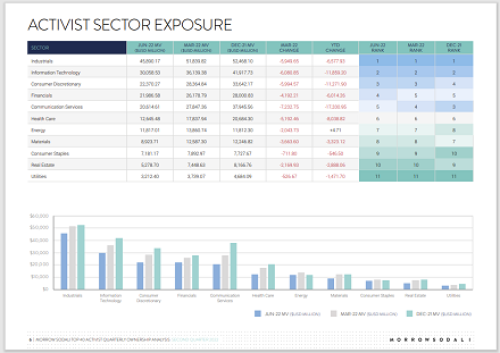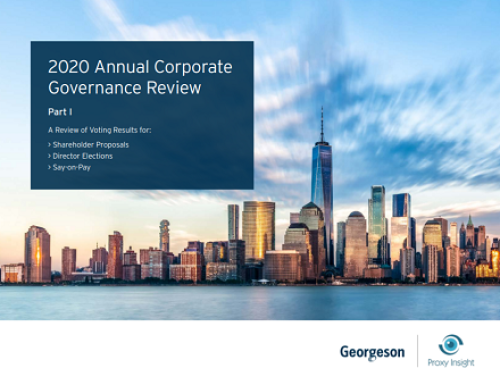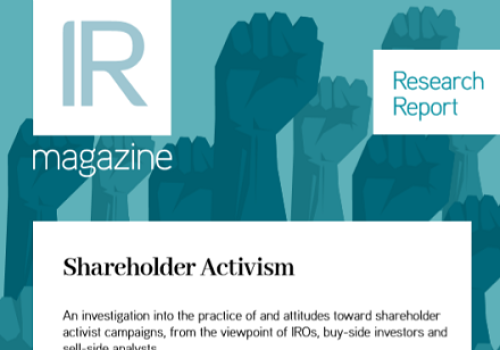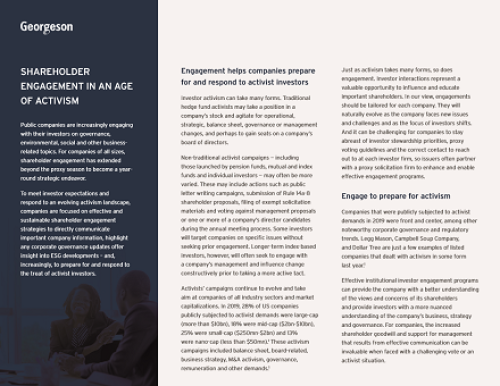Clearway Capital, described by Insightia as ‘Europe’s first dedicated ESG activist fund,’ was thrust into the spotlight this year, with a successful campaign pushing for French energy company TotalEnergies to divest its Russian assets and end the import of oil and natural gas from Russia, following its invasion of Ukraine. Clearway warned that failure to do so would result in shareholder dissent at TotalEnergies’ next annual meeting, with Reuters describing the move as ‘the first public campaign by such a fund calling out a leading company over its response to Russia's invasion of its neighbor’.

Clearway Capital
Gianluca Ferrari, founding partner of Frankfurt-headquartered Clearway, talks to IR Magazine about the TotalEnergies campaign, teaming up with other shareholders and always being on the hunt for a societal benefit.
How would you describe your investment approach?
We are quite a young firm. I set up Clearway last year and we only started our investment activities at the beginning of this year. We operate mainly in the public equity space, buying shares in publicly listed companies, though we have done and will continue to do a sliver of private equity.
The overarching philosophy behind what we do is that, in all of our investments – whether it’s our core business, which is public equity, or in private equity – we look for situations where we feel that through our ownership and by exercising our rights as shareholders, we can bring value add to the table.
When I say value add, what I mean is we can bring both insights and changes to the table that will result in not only better returns for shareholders, but also a measurable societal impact, whether that’s a social impact or an environmental impact.
We think of ourselves as impact investors. And the way we go about [making an impact] is that we look for situations where we think that we have found companies with untapped improvement potential that can be unlocked through engagement. We then take stakes in these companies and engage with their key stakeholders to drive these improvements.
Because of this we are of course considered activist shareholders: we use the tools that more traditional activists would, but unlike most activists, we’re not only looking for the returns – we’re also looking to generate some sort of societal benefit.
How do you weigh up societal benefits versus shareholder returns?
That’s really an interesting question. And it’s really tricky. I’ll start by saying we look for situations where the two things ideally coincide, or at least are not detrimental to one another.
If we take the example of TotalEnergies, we saw a company trading at a very attractive valuation with strong fundamentals and that is set to benefit from changes that are happening in the industry. But its ongoing involvement in Russia – particularly the purchase of Russian oil – was a risk factor due to the situation in Ukraine which, in our view had the potential to increase the company’s cost of capital longer term, permanently impairing its valuation.
As the public pressure was growing for western companies to exit Russia and as Total’s competitors one by one announced their departure – leaving Total as the last oil major that had not yet taken a position – it became clear to us that lists such as The Yale School of Management’s list [of companies continuing operations in Russia] were going to impact investor behavior.
For these reasons we purchased shares, wrote a letter to the board and publicly urged the company to cut its ties with Russia. Following our letter, the Church of England, a TotalEnergies shareholder, also went public, stating that if Total didn’t exit Russia, the Church of England would sell its shares – confirming what we believed was already happening with other sustainability minded investors.
Do you typically engage with other investors in a campaign?
Generally, the short answer is yes. We are usually in contact with a number of fellow shareholders in our portfolio companies and the reason is that, in order to drive change, we typically speak with the key stakeholders of the businesses in which we invest, whether that’s the board and management or other shareholders and company advisors – whoever we need to speak to in order to better understand the effects of our proposals and create the consensus necessary to get them implemented.
Since shareholders are one of the most important stakeholders of any business, we are usually in close contact with the larger shareholders of every company we invest in.
Aside from looking for ESG and value add, are there any themes around the companies that you target?
No, we’re generalists. We invest exclusively in Western Europe developed markets. This means that when we’re looking at companies, these are firms that are – at least from a social and environmental perspective – operating in geographies where they are already held to a relatively high standard. We think that these companies will be the first to feel the effects of any further societal shifts towards increased sustainability, whether that comes in the form of regulatory scrutiny, public opinion, consumer behavior or greater adoption of ESG criteria by institutional investors.
Unlike most sustainability-conscious investors, who are looking for companies that already meet a series of sustainability criteria, such as having high environmental credentials or checking the ESG boxes, we’re typically looking for the laggards, especially those who do not compare well to their closest peers.
We’re looking for companies where we have identified a clear sustainability shortcoming or otherwise, where through engagement, we can improve the impact that these companies have on society.
What examples can you talk about?
We’re currently invested in an Irish business called Glanbia, a conglomerate that operates a series of unrelated food businesses.
The sustainability angle that we’ve identified in this business is two-fold. The first, which is what I consider the low-hanging fruit, concerns the company’s packaging in its consumer facing brands.
Its best-selling product is a whey protein supplement, which is the market leader in the US and an excellent product. But if you look at the packaging, it comes in these big plastic tubs that are actually only two thirds full – there’s a lot of empty space, which is extremely wasteful. It’s also more expensive, because shipping costs go up due to the higher volume. That begs the question of why Glanbia continues to sell these products in these formats instead of shifting towards more environmentally sustainable solutions as many of its competitors in Europe have. Based on our calculations, they could be avoiding between 3 mn to 4 mn tons of plastic annually by making this change alone – and saving money in the process.
This isn’t really going to move the needle too much when you think about it from a macro perspective but it’s the small things that businesses need to be thinking about – so why aren’t they already doing this? It’s better for shareholders, its better for the environment and – we believe – it could also improve the company’s brand perception.
That’s one of the points that we’ve raised publicly with them. The second environmental aspect of our campaign is around their exposure to the dairy industry in some of their businesses. Glanbia’s main raw material is milk, which it sources from dairy farms. We think that because of this, the sustainability objectives of the different businesses that they have are very different: the consumer-facing brands should be focused on improving packaging, while the other businesses that are purchasing milk as a core ingredient should be focused on working with their dairy farm suppliers to help them reduce emissions.
To make a long story short, what we see in this case is a situation where there’s a collection of businesses that, if they were standalone, would be worth substantially more, so it checks the box on what’s good for shareholders. But also from a societal standpoint, each of these businesses deserves a better focus on their respective sustainability objectives, which we think can be achieved by separating the main businesses.


